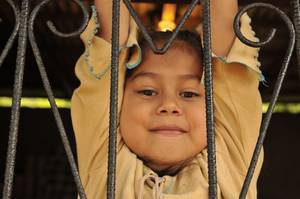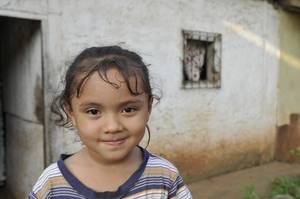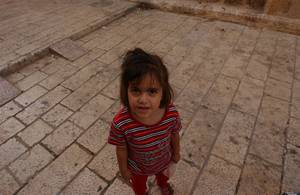Maryann's Reflection
I have watched this film on Colombia so many times. The town where Karen and her family were forced to flee is called “Villa Esperanza.” Which means town of hope.
This town is their town of hope. As the narrator points out, this town has many problems, but it does have hope.
They use dance and pictures and acting and art in many forms to understand and overcome their traumas. This film gives me a different idea of what hope means. “Their pain and hopes are expressed through writing,” the narrator says. True hope comes from true understanding of pain.
Hope is not ignorance of trauma and pain; it is the belief that there is something more. The “senseless violence” is overcome through art. Hope. For me, Lent is about hope.
This study has shed light on wounds in the world, yet we are a people of hope because we know of these problems. If we did not truly understand that magnitude of what was going on around the world our hope would simply be ignorance. Instead, like Karen, we are learning to move forward through art and dance and faith into a world where hope is what sustains us.
About the Author
Maryann Philbrook: She is originally from Louisiana in the United States, but currently lives in Austin, TX. She worked for the World Student Christian Federation in Geneva, Switzerland as the Communications Intern in 2009. Maryann started blogging in 2003, but has really picked up the pace since she started working for WSCF in 2009, with her blog about her experiences in Geneva. Maryann graduated in 2006 from Occidental College in Los Angeles, where she received a bachelor’s degree in Politics. After graduating from University she was a Beatitudes Society Fellow, an Episcopal Urban Intern and an English Language Assistant in France. Aside from being passionate about the French language, Maryann’s heart goes out to reconciliation among different strands of Christianity so that a more just world can be created.
Lucy's Reflection
Why this film about Colombia? It’s short and compared to some of the other films in this study, it seems fairly gentle. There are far more graphic and shocking images which could capture the horror of a country where law has broken down, armed militias act with impunity, millions are displaced and 64% of people live below the poverty line.
When endemic violence has ruined a country over decades, there is no ‘quick fix’. People who have grown up in uncertainty and fear will always carry scars which shape their lives. The young people in this film, and those working with them, are inspiring because they are getting on with life. What defeats death is living – really living, in the moment, and refusing to be paralysed by fear. Sometimes people who have lived in great uncertainty and peril understand this far better than those of us who have lived with the illusion of security and protection most of our lives. Learning from those who have put their trust in God because there was no other choice has been a huge gift to me. When I find myself fretting about minor things, remembering those whose daily life is a matter of life and death can be a useful way of adjusting my perspective. American theologian Sharon Welch has written about how despair can be a luxury for those who consider themselves powerful and whose lives are generally easy. It’s easy to despair about the big issues – climate change, nuclear proliferation, etc. – when there is food in our fridges and a roof over our heads. We can sigh and feel powerless. Welch points us to the example of those who cannot take these things for granted – who cannot avoid the daily struggle to put food in their children’s mouths and keep themselves free from violence. For these people, finding ways to use what power they have to change their world is not an intellectual problem – it is a daily necessity. They do not have the luxury of sighing and pondering what they should do and from them we can learn that each of us must use whatever power we have, each day, to work for change.
This film can seem innocuous – some kids dancing. Another reason why we chose this film is that many of those who work for change in Colombia live in daily fear of violence and death. Those who seek to maintain their own power – militias, drugs cartels and gangsters – murder with impunity, to maintain the climate of fear. For some community workers in Colombia, it is simply too dangerous to be seen on an internet film. For them to talk about their work to build community, even through playschemes or homework clubs or dance lessons, would be to risk execution or their kids being kidnapped. This is the brutal reality of a society where endemic violence has taken hold. So showing this film, already available through UNFP, whose participants have already made the brave decision to take part, protects and hopefully reminds us of the many thousands of ordinary people who are working in small ways to promote human dignity and life in a place where violence and death threaten to overwhelm them. Hope and courage are gifts of the Spirit but they are also disciplines to be practised day by day.
About the Author
Lucy D’Aeth: She is an English born New Zealander who has been living in Switzerland for two years. Most of her time at present is taken up being mother to three young children (11,9 and 5), but in previous lives she has studied history and theology and has worked for churches and in Public Health. She is active in her local Lutheran Church and is daily challenged and enriched by living in such a multicultural community.
Maria's Reflection
Colombia:
Claiming the Right to Health and Life in a Region of Death
Colombia is truly a country of contradictions. While watching the video Claiming the Right to Health and Life in a Region of Death, I felt uneasy and happy at the same time. Uneasy to see a reality that is systematic in my country and happy to see that people are full of resilience, and that there are projects to educate children and youth to overcome and deal with the consequences of violence.
The story of Karen is just one among many others, especially in areas highly affected by the conflict, where internally displaced people accept reality and learn to cope with violence as it were normal. Paradoxically women take a double burden, they are not only directly affected by the conflict but also by the macho culture that permeates structures and life in Colombia. A culture that unconsciously gives less value to women, that pushes them to forsake themselves for their families and that negatively influences their self-esteem and their personal and professional development, especially in poor areas.
As a Colombian who lives outside the country, cultural violence is no longer normal. I grew up in a family where the men did not have to clean, cook or make the dishes, or their beds. I grew up in a city where a high percentage of women normally become pregnant at the age of 14 - 18, where men beat up women, and where women are, in many cases and several occasions, seen as sexual objects. Living outside Colombia and working in the field of education makes me deeply reflect about the paradoxical reality of my country and reject what seems normal and common for many Colombians.
Is it the conflict that creates violence or is it the endemic and cultural violence that perpetrates so many injustices? I tend to believe the second. I believe that sexual and physical abuse of children and women, and gender discrimination at the economic and social areas, are the result of a macho culture that justifies unjust structures. I believe that this type of cultural violence is rooted in the lack of respect for the other, the lack of empathy with the other gender and the national and cultural blindness to acknowledge each other’s commonalities and complementarities.
I do think that educational programs are useful to fight against this type of violence but above this, I firmly believe that nurturing faith can make a greater difference. I am not talking about faith as a simple belief in something unknown, but faith as a powerful source of trust in each other, of trust in the goodness of the other, in the value that each one brings to a relationship. Faith as a spiritual recourse when violence takes place but also as a preventive measure that combines trust and action, and that results in more equal and just relationships. Nurturing faith in both men and women can help to bring about mutual respect and positively reconcile what seems to be deeply rooted in our culture.
Can our faith during this lent provide power to the powerless and transform unjust structures and cultural violence?
About the Author
Maria Lucia Uribe is a Colombian living in Switzerland since 2005. She just started a Master in Peace and Conflict Transformation with the World Peace Academy in Basel, after working for four and a half years with Arigatou International in the development of a manual on ethics education and interfaith learning. Maria Lucia is passionate about education, religions and the empowernt of children and young people. You can read her blog, that she started four years ago about her daily life and reflections that touch her heart and soul during a journey, that she believes, is meant to help to transform the world.






